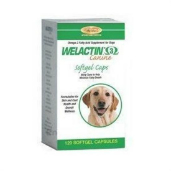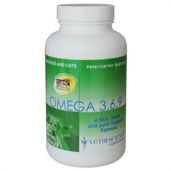Fatty acids are grouped into two primary categories: omega-3 and omega-6 fatty acids. These are types of healthful polyunsaturated fats. Fats can be confusing, and many people mistakenly believe all fat is bad. However, unsaturated fats are considered healthy fats, while saturated and trans fats are the unhealthy types.
"Fatty acids boost heart health and lower the risk of heart disease in dogs and cats."
The benefits of omega-3 and omega-6 fatty acids have been widely touted for humans, and research about their benefits for cats and dogs is catching up. Fatty acids are considered essential for cats and dogs because they must obtain them from food, as their bodies do not produce the nutrients naturally.
Benefits of Fatty Acids in Dogs and Cats
Omega-3 and omega-6 fatty acids are basic nutrients that aid in general biological functions. Beyond that, they are credited with various specific benefits in cats and dogs. Increased intake can help remedy or manage a number of conditions in these pets.

Perhaps the most significant improvements can be seen in skin and coat health. In addition to improving the condition and appearance of coat and skin, fatty acids can reduce skin inflammation and irritation, making pets more comfortable and preventing potentially dangerous scratching. They are also useful in the management of allergic and autoimmune conditions that negatively affect skin and coat health.
The potent anti-inflammatory benefits of fatty acids have other uses, too. Their anti-inflammatory action helps reduce symptoms associated with inflammatory conditions such as arthritis, bursitis, inflammatory bowel disease, and many infections. Plus, fatty acids boost heart health and lower the risk of heart disease in cats and dogs.
Sources of Fatty Acids for Dogs and Cats
Fatty acids are found most abundantly in fish oils and in oils derived from nuts and seeds, so fish and plant-based oils that are appropriate for cats and dogs are good sources. Many commercial pet foods are low in fat content, and especially in healthy unsaturated fats such as omega-3 and omega-6. Opt for products that indicate they contain these beneficial fatty acids.

Ask your veterinarian about whether a fatty acid supplement would be beneficial for your pet. These are often recommended, particularly if your cat or dog’s diet is low in fatty acids or if your pet has a condition that is known to improve with increased fatty acid intake. There are many fatty acid supplements available for cats and dogs made from fish oil, plant oils, or a combination of both. Some popular options include AllerG-3, Welactin, and Omega 3,6,9. While consulting your veterinarian, ask whether fish oil-based or plant-based supplements are best for your animal, and work with your vet to determine an appropriate omega-3 to omega-6 ratio.
Sources
http://www.omega3learning.uconn.edu/diet-health/view/pet-owners/articles/are-omega-3-fatty-acids-essential-for-my-dog-and-cat/